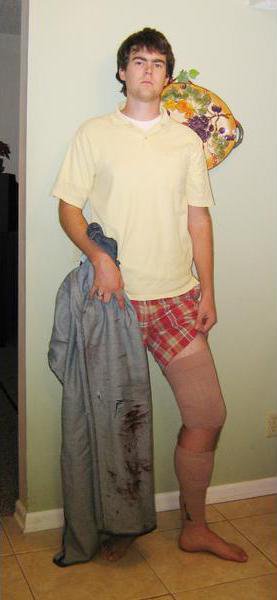A bobcat attacked a man near Kennedy Pond Thursday, and officials believe the animal may have rabies.
Alex Deloe, 20, Savannah, wasn't able to kill or contain the beast before it fled after repeatedly biting and clawing him. It ended its attack after Deloe choked it, weakening it, he said.
Deloe lives in Savannah but stays with his grandmother, Wanda Levangie, while he attends classes at Georgia Southern University, Levangie said.
The attack frightened her as well.
"We had just finished lunch around 1:30 p.m.," she said. Alex walked out behind Levangie's Tillman Pond Road home towards the tractor shelter, planning to do some clearing work for a neighbor.
When he went inside the shelter, "I heard something," he said. Not seeing what made the noise, he placed his foot on the step of the tractor, preparing to climb aboard, when "the bobcat shot out from under it and started going at me."
It bit him on the foot, and he kicked it away, but it kept coming, he said. Each time it attacked, it climbed higher up his leg.
"It was thrashing around, growling and clawing at me," he said. "I kicked at it and it grabbed the back of my calf."
It took the hide off his leg, he said.
There wasn't much room in the tractor shelter for the struggle, and as Deloe moved towards the door to get help, the bobcat continued its attack.
"It was trying to get me any way it could," he said.
Levangie said she heard Deloe yelling for help and went outside to see what was going on.
"He came out (with the bobcat clinging to his waist) and I thought, 'what has he caught now?'" Then she realized it wasn't Deloe who had caught the cat, it was the cat who had Deloe.
"He yelled 'Get the gun, do something, help me!'" she said. "The bobcat had bit him and wouldn't turn loose."
Deloe said the bobcat lunged at his upper thigh and bit down, but his leather belt deflected the worst of it's attack.
Its teeth sunk into the belt and somehow its claws scratched - and bent - his cell phone, Levangie said.
That's when Deloe grabbed the bobcat by the neck and "squeezed it until it turned loose, and he threw it to the ground," she said.
A relative ran inside and got a gun, but the clip was nowhere to be found.
The cat staggered and stumbled as it recovered, and headed for her garage, she said. While Levangie ran to close the garage door so the bobcat would not go inside, Deloe ran around the house to see if he could find the cat after securing ammunition. The cat had disappeared, he said.
He and his grandmother headed for the hospital for treatment of his wounds, which were rather severe, he said.
'There were at least four bite marks, a bunch of claw marks, and a six-inch gash that needed stitches," he said. The doctors did not stitch the wound because it had been inflicted by a wild animal and there was risk of infection, he said.
"There is a hole in the second bite about a quarter of an inch deep, the size of a dime," he said.
Deloe was treated for rabies as well, taking about 20 shots, with more to come, he said.
"I think (the bobcat) was more scared, but it could have had rabies," he said.
Bulloch County Humane Enforcement officers Christopher Ivey and Joey Sanders responded to the scene after Deloe filed a report, but since it was a couple hours afterward, they found no sign of the bobcat.
Ivey said he has heard many people claim sightings or attacks by bobcats, but usually it is found that the animal involved was only a domestic-type cat that had gone feral. However, "you could tell by the marks on his leg it was definitely a bobcat," he said. "They said it was dazed and confused, so it was definitely sick."
The last time a bobcat attack was reported was May 1995, when a bobcat attacked Jeannie Taylor at her miniature horse farm near Portal.
Taylor had heard one of the horses scream and went to investigate, finding the bobcat. It went for her, but one of her dogs stopped it and enabled her to seek shelter in a bunkhouse near the barn, she said.
The cat had raked one mare across her back, bit another and bit the dog. She let the dog inside with her after it was attacked, grabbed a gun and shot the bobcat, but it ran underneath the bunkhouse and she was afraid to exit, she said.
She called for help, and both she and her husband ended up taking rabies shots as a precaution, since they handled the exposed animals.
Ivey said he and Sanders would be contacting the Department of Natural Resources to discuss setting traps for the escaped animal that attacked Deloe.
"We know we have rabies in the county," he said, citing two cases last year where dogs were found to have the disease. He warned citizens to avoid wild animals or strange animals, especially if they are showing odd behavior.
Rabid animals only foam at the mouth in the final stages of the disease, he said. Other indications an animal may be rabid include stumbling, not being able to stand well, being active in populated areas during the day when it is usually a reclusive animal, and not showing a natural fear of humans.
Holli Deal Bragg may be reached at 489-9414.
Alex Deloe, 20, Savannah, wasn't able to kill or contain the beast before it fled after repeatedly biting and clawing him. It ended its attack after Deloe choked it, weakening it, he said.
Deloe lives in Savannah but stays with his grandmother, Wanda Levangie, while he attends classes at Georgia Southern University, Levangie said.
The attack frightened her as well.
"We had just finished lunch around 1:30 p.m.," she said. Alex walked out behind Levangie's Tillman Pond Road home towards the tractor shelter, planning to do some clearing work for a neighbor.
When he went inside the shelter, "I heard something," he said. Not seeing what made the noise, he placed his foot on the step of the tractor, preparing to climb aboard, when "the bobcat shot out from under it and started going at me."
It bit him on the foot, and he kicked it away, but it kept coming, he said. Each time it attacked, it climbed higher up his leg.
"It was thrashing around, growling and clawing at me," he said. "I kicked at it and it grabbed the back of my calf."
It took the hide off his leg, he said.
There wasn't much room in the tractor shelter for the struggle, and as Deloe moved towards the door to get help, the bobcat continued its attack.
"It was trying to get me any way it could," he said.
Levangie said she heard Deloe yelling for help and went outside to see what was going on.
"He came out (with the bobcat clinging to his waist) and I thought, 'what has he caught now?'" Then she realized it wasn't Deloe who had caught the cat, it was the cat who had Deloe.
"He yelled 'Get the gun, do something, help me!'" she said. "The bobcat had bit him and wouldn't turn loose."
Deloe said the bobcat lunged at his upper thigh and bit down, but his leather belt deflected the worst of it's attack.
Its teeth sunk into the belt and somehow its claws scratched - and bent - his cell phone, Levangie said.
That's when Deloe grabbed the bobcat by the neck and "squeezed it until it turned loose, and he threw it to the ground," she said.
A relative ran inside and got a gun, but the clip was nowhere to be found.
The cat staggered and stumbled as it recovered, and headed for her garage, she said. While Levangie ran to close the garage door so the bobcat would not go inside, Deloe ran around the house to see if he could find the cat after securing ammunition. The cat had disappeared, he said.
He and his grandmother headed for the hospital for treatment of his wounds, which were rather severe, he said.
'There were at least four bite marks, a bunch of claw marks, and a six-inch gash that needed stitches," he said. The doctors did not stitch the wound because it had been inflicted by a wild animal and there was risk of infection, he said.
"There is a hole in the second bite about a quarter of an inch deep, the size of a dime," he said.
Deloe was treated for rabies as well, taking about 20 shots, with more to come, he said.
"I think (the bobcat) was more scared, but it could have had rabies," he said.
Bulloch County Humane Enforcement officers Christopher Ivey and Joey Sanders responded to the scene after Deloe filed a report, but since it was a couple hours afterward, they found no sign of the bobcat.
Ivey said he has heard many people claim sightings or attacks by bobcats, but usually it is found that the animal involved was only a domestic-type cat that had gone feral. However, "you could tell by the marks on his leg it was definitely a bobcat," he said. "They said it was dazed and confused, so it was definitely sick."
The last time a bobcat attack was reported was May 1995, when a bobcat attacked Jeannie Taylor at her miniature horse farm near Portal.
Taylor had heard one of the horses scream and went to investigate, finding the bobcat. It went for her, but one of her dogs stopped it and enabled her to seek shelter in a bunkhouse near the barn, she said.
The cat had raked one mare across her back, bit another and bit the dog. She let the dog inside with her after it was attacked, grabbed a gun and shot the bobcat, but it ran underneath the bunkhouse and she was afraid to exit, she said.
She called for help, and both she and her husband ended up taking rabies shots as a precaution, since they handled the exposed animals.
Ivey said he and Sanders would be contacting the Department of Natural Resources to discuss setting traps for the escaped animal that attacked Deloe.
"We know we have rabies in the county," he said, citing two cases last year where dogs were found to have the disease. He warned citizens to avoid wild animals or strange animals, especially if they are showing odd behavior.
Rabid animals only foam at the mouth in the final stages of the disease, he said. Other indications an animal may be rabid include stumbling, not being able to stand well, being active in populated areas during the day when it is usually a reclusive animal, and not showing a natural fear of humans.
Holli Deal Bragg may be reached at 489-9414.

